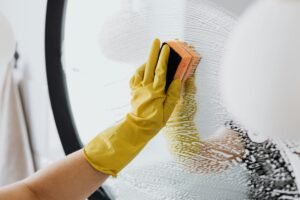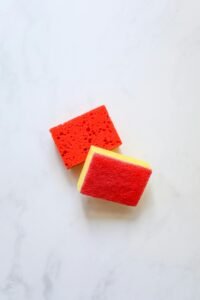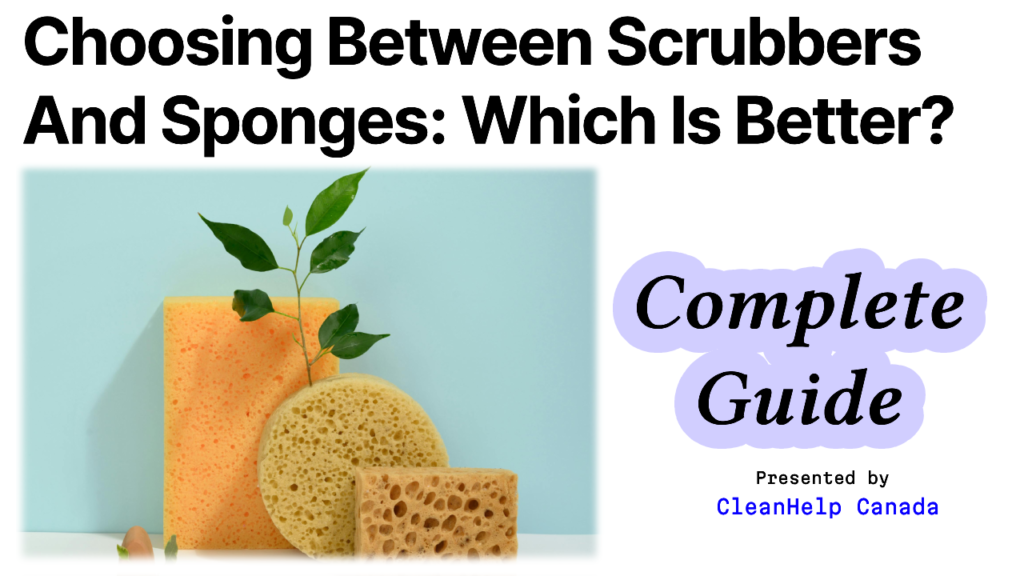When it comes to keeping your home sparkling clean, choosing the right cleaning tool is crucial. In the debate of scrubbers vs. sponges, understanding their unique features can help you select the best option for your cleaning needs. At CleanHelp Canada, we are dedicated to providing top-notch cleaning services and advice. Whether you’re in London, Ontario, or anywhere else, this cleaning tool comparison will help you make an informed choice. Let’s dive into the world of scrubbers vs. sponges and discover which tool suits your needs best.
1. Introduction
Selecting the right cleaning tool can significantly affect your cleaning efficiency and results. In the debate of scrubbers vs. sponges, understanding the differences between these tools is essential for making an informed choice. At CleanHelp Canada, we offer expert cleaning services and advice for homes in London, Ontario, and beyond. This cleaning tool comparison will help you decide whether a scrubber or a sponge is the best choice for your cleaning needs. Let’s explore how scrubbers vs. sponges can influence your cleaning routine.
2. What Are Scrubbers?

Scrubbers are designed for heavy-duty cleaning tasks and are known for their abrasive qualities. Here’s a closer look at different types of scrubbers:
- Scouring Pads: These are made from metal or synthetic fibers and are excellent for removing tough grime and burnt-on food from pots and pans. They are durable and designed to handle high levels of wear and tear.
- Scrub Brushes: Featuring bristles, scrub brushes are perfect for cleaning hard-to-reach areas like grout lines and tiles. They come in various shapes and sizes to tackle different surfaces effectively.
- Sponge Scrubbers: These combine the softness of a sponge with the abrasiveness of a scrubber. They are versatile for various cleaning tasks, offering a balance between gentle wiping and tough scrubbing.
Advantages of Scrubbers
- Effective on Tough Stains: Scrubbers vs. sponges: Scrubbers excel at tackling stubborn dirt and grime. Their abrasive nature makes them ideal for removing baked-on food and other difficult residues.
- Variety of Designs: There are numerous types of scrubbers available, from coarse metal pads to softer, more flexible options. This variety ensures that you can find a scrubber suited to any cleaning challenge.
- Durable: Many scrubbers are built to withstand rigorous use. They are often made from high-quality materials that ensure longevity, even under heavy use.
Disadvantages of Scrubbers
- Can Scratch Surfaces: While effective, some scrubbers may damage delicate surfaces. It’s crucial to choose the right type for specific surfaces to avoid scratches.
- Higher Maintenance: Scrubbers need regular cleaning to avoid bacteria buildup. They can also become worn out faster than sponges, necessitating more frequent replacements.
3. What Are Sponges?
Sponges are known for their absorbency and gentleness. Here’s what you need to know about sponges:

- Cellulose Sponges: Made from natural fibers, these sponges are great for everyday cleaning tasks. They are biodegradable, making them an eco-friendly choice.
- Synthetic Sponges: Created from man-made materials, synthetic sponges often come with scrubber pads attached. They are versatile and can handle various cleaning tasks.
Advantages of Sponges
- Soft and Gentle: Sponges are safe for use on delicate surfaces and won’t scratch them. This makes them ideal for cleaning sensitive items like non-stick cookware.
- Highly Absorbent: They are effective at wiping up spills and absorbing liquids. Their high absorbency makes them excellent for general cleanup tasks.
- Affordable: Sponges are typically inexpensive and easy to replace. This cost-effectiveness makes them a popular choice for everyday use.
Disadvantages of Sponges
- Can Harbor Bacteria: Without proper cleaning, sponges can become a breeding ground for bacteria. This can pose hygiene risks if not addressed.
- Less Effective on Tough Stains: Sponges are not ideal for heavy-duty scrubbing tasks. They may struggle with stubborn stains and grime, making them less suitable for challenging cleaning jobs.
4. Key Differences Between Scrubbers and Sponges
In the scrubbers vs. sponges debate, several key on cleaning tool comparison:
| Feature | Scrubbers vs. Sponges | Scrubbers | Sponges |
|---|---|---|---|
| Material | Abrasive materials or bristles | Metal, synthetic fibers, or bristles | Cellulose or synthetic materials |
| Best For | Tough stains and grime | Heavy-duty cleaning | General cleaning and spills |
| Surface Safety | Can scratch surfaces | Risk of surface damage | Gentle on surfaces |
| Maintenance | Requires regular cleaning | Regular cleaning needed | Needs rinsing and drying |
| Durability | Often more durable | Generally durable | Less durable |
5. When to Use Scrubbers
When choosing between scrubbers vs. sponges, consider using scrubbers in the following situations:
- Removing Stubborn Stains: Scrubbers are ideal for tackling tough grime on pots, pans, and other surfaces. Their abrasive nature helps break down and remove persistent stains.
- Scrubbing Hard Surfaces: Perfect for cleaning tiles, grout, and countertops that need extra abrasive action. Scrubbers are effective at getting into crevices and removing built-up dirt.
- Heavy-Duty Cleaning: Use scrubbers for more challenging tasks like outdoor cleanups or garage cleaning. They can handle the tougher aspects of cleaning that sponges may not manage effectively.
Tips for Using Scrubbers:
- Test on a small, inconspicuous area to avoid damaging delicate surfaces.
- Clean scrubbers thoroughly after use to maintain effectiveness and hygiene. Regular cleaning ensures that they stay free from bacteria and odors.
6. When to Use Sponges
In the scrubbers vs. sponges discussion, sponges are best used for:
- General Cleaning: Ideal for wiping surfaces, cleaning dishes, and managing everyday spills. Sponges are perfect for tasks that require a gentler touch.
- Delicate Surfaces: Safe for use on non-stick cookware and other sensitive surfaces. Sponges provide a soft touch that won’t damage delicate materials.
- Absorbing Liquids: Effective for soaking up spills and messes quickly. The high absorbency of sponges makes them excellent for cleanup tasks where liquid absorption is key.
Tips for Using Sponges:
- Rinse sponges well after use and let them dry completely to prevent bacteria growth. Drying sponges thoroughly helps avoid unpleasant odors and bacterial buildup.
- Replace sponges regularly to ensure hygiene and effectiveness. Sponges should be replaced every few weeks, or sooner if they become worn or soiled.
7. Pros and Cons of Scrubbers
Pros:
- Effective on Stains: Scrubbers vs. sponges: Scrubbers are great for removing tough stains and residues. They provide the abrasive action needed for challenging cleaning tasks.
- Variety: Available in many forms to handle different cleaning tasks. This variety ensures you can select a scrubber suited to any specific need.
Cons:
- Surface Damage: May scratch or damage delicate surfaces if not used carefully. It’s important to choose the right scrubber for each task to prevent damage.
- Maintenance: Requires regular cleaning and replacement to prevent bacteria buildup. Proper maintenance is necessary to keep scrubbers effective and hygienic.
8. Pros and Cons of Sponges
Pros:
- Gentle: Safe for most surfaces and less likely to cause damage. Sponges provide a soft touch that’s ideal for sensitive surfaces.
- Highly Absorbent: Ideal for general cleaning and absorbing liquids. Sponges excel at managing spills and wiping up messes.
Cons:
- Bacteria Growth: Can harbor bacteria if not cleaned properly and regularly. Regular cleaning and drying are essential to prevent bacterial contamination.
- Less Effective on Tough Stains: Not suitable for heavy-duty scrubbing tasks. Sponges may struggle with challenging stains and residues.
9. How to Choose the Right Tool for Your Needs
Choosing between scrubbers vs. sponges, the cleaning tool comparison depends on your specific cleaning needs:
- For Tough Cleaning Tasks: If you need to tackle tough stains, grime, or residues, scrubbers are your best bet. They offer the abrasive power needed for heavy-duty cleaning.
- For Gentle Cleaning: When dealing with delicate surfaces or everyday spills, sponges are the better choice. They provide a soft, absorbent surface ideal for gentler cleaning tasks.
- Consider the Surface: Match the cleaning tool to the surface you’re working on. Use scrubbers on durable surfaces and sponges on sensitive or delicate surfaces.
10. Cleaning and Maintaining Your Tools
Proper care and maintenance extend the life and effectiveness of your cleaning tools:
Scrubbers:
- Clean Regularly: Rinse thoroughly after use and ensure they are free from food particles and grime.
- Dry Completely: Allow scrubbers to dry completely to prevent bacterial growth and odors.
- Replace as Needed: Check for wear and tear. Replace scrubbers when they become worn or lose their effectiveness.
Sponges:
- Rinse After Use: Rinse sponges thoroughly to remove food particles and residues.
- Dry Properly: Ensure sponges dry completely between uses to prevent bacteria growth.
- Regular Replacement: Replace sponges regularly, typically every few weeks, to maintain hygiene and performance.
11. Conclusion
In the scrubbers vs. sponges debate, in the cleaning tool comparison both tools have their distinct advantages and uses. Scrubbers are perfect for heavy-duty cleaning and tackling stubborn grime, while sponges are ideal for everyday cleaning and delicate surfaces. At CleanHelp Canada, we understand the importance of using the right tools for your cleaning needs. Whether you’re in London, Ontario, or anywhere else, choosing the right tool can make all the difference in achieving a clean and sparkling home. For more expert cleaning tips or to schedule a professional cleaning service, visit CleanHelp Canada.
By understanding the differences between scrubbers and sponges, you can make an informed choice and enhance your cleaning routine. Whether you choose a scrubber for tough tasks or a sponge for gentle cleaning, both tools play a crucial role in maintaining a clean and hygienic environment.
